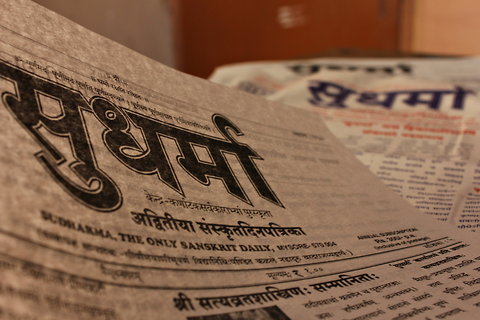Mysuru: As the country celebrates the World Sanskrit Week to popularise the ‘language of the gods’, which previous External Affairs Minister, the late Sushma Swaraj, claimed was a modern language fit for computers, the only Sanskrit daily of India, Sudharma, published from here, is struggling for survival.
Economics apart, the number of patrons of this newspaper, celebrating its 50th anniversary, is dwindling. The management has now sought help from various government agencies which have shown little interest so far.
Sudharma was started by Pandit Varadaraja Iyengar, a Sanskrit scholar, in 1970, to reach out to those who loved the language and were interested in promoting it. These days, his son K.V. Sampath Kumar and his wife Jayalakshmi are continuing to keep the legacy alive.
The newspaper, an-A3-size, two-page and five-column-sheet, has around 3,000 subscribers, mostly institutions and public libraries, who receive the copies by post. The e-version has around a lakh readers.
While newspapers in Hindi and other languages continued to do well, Sudharma, the only Sanskrit daily was finding it hard to keep running, as it seems to have run out of resources.
“That’s because no state or central body comes forward to assist us in any way and the response from various organisations in the private sector is indifferent,” according to the editor K.V. Sampath Kumar.
Jayalakshmi, who is well versed in Hindi, Tamil, Kannada, English and, of course, Sanskrit, believes the latter is a great language. People use it from birth to death for conducting Vedic rituals and religious ceremonies right across the length and breadth of the country.
India is united by Sanskrit, which is the mother language sustaining so many languages in the country. It is growing, and now, even IT professionals are finding it is useful, she said.
Sampath Kumar’s father Pandit Varadaraja Iyengar started the Sanskrit paper on July 15, 1970, as a mission to promote use of Sanskrit. His vision and mission is now being continued by his son.
Credit for starting Sanskrit radio bulletins on Akashvani goes to his father, who successfully persuaded the then Information and Broadcasting Minister I.K. Gujral to start daily news bulletins in Sanskrit.
Priced at Rs 1.75, the paper mostly contains articles on Vedas, yoga, religion as also on politics and culture, among others. Sudharma’s modest office in Ramchandra Agrahara has been visited by Ministers, Governors, Shankaracharyas, and other dignitaries.
Being the Sanskrit and Yoga capital of India, Mysuru has a fairly good strength of scholars. Interest in Ayurveda and alternative medicines has also led to an increase in the demand for Sanskrit learning centres.
Scholars say Sanskrit was considered the ‘language of the gods’ in India. Despite the contribution Sanskrit has made to Indian philosophical and literary traditions, vested interests have spread the impression that the language was dead, inaccessible and of negligible relevance to daily life. This is far from true.
For the publishers of Sudharma, the newspaper is not so much a profitable venture but a mission, and a demonstration of love for the language which is now gaining international recognition.
Sampath Kumar is being honoured later on Friday by the HRD Ministry for his contribution to Sanskrit language at a function in New Delhi organised by the World Sanskrit Sansthan.
IANS







































